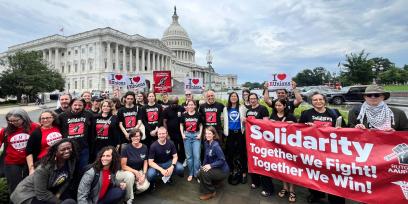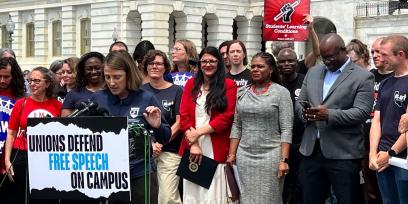On May 23, a congressional committee grilled two university presidents and a chancellor, attacking them for upholding one of the most important elements of higher education: freedom of expression. More than 40 AFT members traveled to Washington, D.C., to support them, pushing back against the McCarthy-esque session and standing up for students’ right to free speech on their campuses.
It was the fifth hearing held by the House Education and the Workforce Committee, where extremist politicians have excoriated K-12 administrators and high-profile academics—this time from Rutgers University; the University of California, Los Angeles; and Northwestern University—for failing to immediately disperse all students demonstrating against the war in Gaza. AFT members and leaders acknowledged the threat of antisemitism as well as Islamophobia but held strong to support for students—and faculty and staff who have joined them—who are peacefully demonstrating.
“The Committee’s inquiries are carried out on the premise that there is a pervasive climate of antisemitism at our universities,” the leaders said in a joint statement. “As faculty members and graduate workers who teach and work every day on our campuses and who are closely engaged with students from many diverse backgrounds, we reject this characterization.” Instead, they said, the committee’s true purpose is a thinly veiled attack on higher education itself, “part of a wider conservative effort to stifle and curtail freedom of speech, freedom of assembly, and freedom of expression throughout society.”
Regarding demonstrations, the leaders said they “fall squarely within the traditions of free speech and academic freedom. Academic freedom is essential to our public universities, and our unions are committed to protecting that freedom for everyone in the university community.” The issue goes beyond campuses, they said: “Defending our universities at this moment is necessary to defend the basic principles of US democracy.”
The committee hearing followed earlier sessions held over the last six months targeting other colleges; each time, academics both rejected antisemitism and embraced free speech.
“We have to be able to be against hate and against violence … and stand up for academic freedom and free expression,” said AFT President Randi Weingarten, who joined union leaders at a pre-committee hearing press conference. “We can do both.”
Finding a way through
At the press conference, Rutgers University AAUP-AFT President Todd Wolfson called the hearings a “witch-hunt” and said Rutgers President Jonathan Holloway, who was called before the committee, did the right thing when he negotiated with encampment participants rather than arresting them. In exchange for dismantling the encampment, Rutgers agreed to enroll 10 displaced Palestinian students, create an Arab and Muslim student cultural center and listen to a formal presentation by protesters about divesting from Israel-related investments.
A similar agreement at Northwestern includes five scholarships for Palestinian students, roles for two Palestinian professors and more transparency in university investments. The committee attacked the two leaders for “caving” to student demands, but the presidents insisted their course of action modeled peaceful negotiation and was the safest, most effective way forward.
Leaders at UCLA handled the protests differently, calling in police to clear the cease-fire encampment when violence from outside agitators threatened campus safety—though only encampment participants were arrested, not counter-protesters. “At UCLA we have seen how failure to protect free speech and peaceful protest has put our students and colleagues at risk,” said Caroline Luce, communications chair for University Council-AFT at UCLA. “Rubber bullets, tear gas and stun grenades do not keep our students safe.” Weingarten agreed. “The campus community has to be able to engage in peaceful protests without administrators sending in SWAT teams and … without the kind of violence we saw at UCLA,” she said.
The union leaders at the hearing—from Rutgers AAUP-AFT, representing full-time faculty, graduate workers, postdoctoral associates and counselors; Rutgers Adjunct Faculty Union; University Council-AFT, representing contingent teaching faculty and librarians at UCLA; the California Federation of Teachers, the statewide AFT affiliate; as well as Northwestern AAUP at Northwestern University—represent tens of thousands of faculty, graduate workers and others who believe deeply that speaking out and demonstrating are not only constitutionally guaranteed rights, but vibrant components of the meaningful inquiry that is such a crucial part of higher education.
Preserving academic inquiry and freedom
On the day of the hearing, a handful of U.S. congressional representatives joined AFT leaders at a press conference on the Capitol grounds to amplify their message. Speakers suggested that the accusation of antisemitism is actually a cover for attacks higher education writ large; they pointed out that actual antisemitic events such as the violence at the University of Virginia in Charlottesville go unaddressed. “The hearings today were a shameful farce,” said Mia McIver, president of the California Federation of Teachers Universities Council. “They are fruit of a decadeslong attack on higher ed,” including defunding, privatization, undue influence from donors, exploitation of contingent labor, program closures and more.
To truly understand what is happening on campuses, it is essential to hear from the people who work and learn there, said union leaders: faculty, students and staff. “We urge the Committee and the public to listen to the people who work and study on our campuses, whose experiences reflect the actual threats to public universities coming from decades of declining funding and a long-term conservative offensive against higher education,” they said in their statement. “We embrace a shared objective of robust discussion on our campuses to help all students arrive at a deeper and fuller understanding of our society and our world.”
[Virginia Myers]


